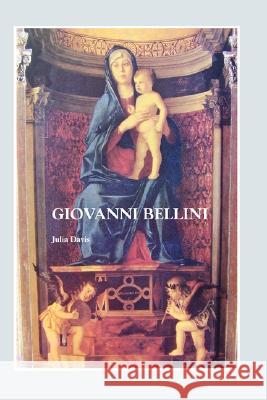Giovanni Bellini » książka
Giovanni Bellini
ISBN-13: 9781861711649 / Angielski / Miękka / 2008 / 124 str.
Giovanni Bellini
ISBN-13: 9781861711649 / Angielski / Miękka / 2008 / 124 str.
(netto: 64,65 VAT: 5%)
Najniższa cena z 30 dni: 67,13
ok. 16-18 dni roboczych.
Darmowa dostawa!
GIOVANNI BELLINI Giovanni Bellini (c . 1430-1516) is the author of some of the most exquisite of Renaissance paintings. He is, in a sense, the painter s painter, who had a long career, like his pupil, Titian, in painting. He influenced many artists, among them Titian, Giorgione, Vecchio, Sebastiano del Piombo, and Albrecht Durer. His influences include Andreas Mantegna, his father, Jacopo Bellini, Antonello, and Donatello. Bellini does everything in his paintings that Renaissance painters are supposed to do: he painted beautiful pictures, devotional images, of the Madonna, Christ and various saints; he painted mythological scenes, and scenes from history; he refined and defined Early Renaissance space, bringing it into the High Renaissance; he inaugurated a new feeling for landscape; he remained true to the sacred and emotional aspects of painting to the end of his career; he developed the various formats of Renaissance painting - the small, private devotional pictures, the large, public altarpieces, a host of secular portraits and large-scale friezes. One might see Bellini as supremely a high Renaissance artist, especially in his later altarpieces, where his sense of space seems in tune with Titian or Raphael. Bellini s style is very sweet. His paintings are full of a love for painting, and a love for his subjects. The ambiguities in his works do not arise from his intentions, which are, as with so many Renaissance painters, to be as exalting as possible. So his Madonnas and saints are lovingly painted. There is an undeniable sensuality in Giovanni Bellini s art. Central to his art is his sensuality. It is the same with the art of Leonardo, Caravaggio, Titian, Vermeer, Rembrandt, and Rubens. The sensuality of the paintings themselves, as objects, is crucial to their evaluation aesthetically. Bellini is a sensual painter - not simply in his treatment of eroticism, or in the eroticism of his forms, but also because he painted self-consciously erotic subjects. He painted female nudes: the Woman with a Mirror (in Vienna), in The Feast of the Gods (in Washington) and in the restollo of Truth (in Venice). Giovanni Bellini s sacred art is as erotic as his secular art, as with many a painter. Indeed, one might say that some of Bellini s Christian paintings are more erotic than his paintings of mythological or historical subjects. His Pietas, for instance, with that lovingly described dead, nude Christ, may be seen as more erotic than the Classical scenes. The eroticism of art depends a lot on the viewer s response. And on painterly surface and technique. "
GIOVANNI BELLINI
Giovanni Bellini (c . 1430-1516) is the author of some of the most exquisite of Renaissance paintings. He is, in a sense, the painter’s painter, who had a long career, like his pupil, Titian, in painting. He influenced many artists, among them Titian, Giorgione, Vecchio, Sebastiano del Piombo, and Albrecht Durer. His influences include Andreas Mantegna, his father, Jacopo Bellini, Antonello, and Donatello.
Bellini does everything in his paintings that Renaissance painters are supposed to do: he painted beautiful pictures, devotional images, of the Madonna, Christ and various saints; he painted mythological scenes, and scenes from history; he refined and defined Early Renaissance space, bringing it into the High Renaissance; he inaugurated a new feeling for landscape; he remained true to the sacred and emotional aspects of painting to the end of his career; he developed the various formats of Renaissance painting - the small, private devotional pictures, the large, public altarpieces, a host of secular portraits and large-scale friezes.
One might see Bellini as supremely a high Renaissance artist, especially in his later altarpieces, where his sense of space seems in tune with Titian or Raphael. Bellini’s style is very sweet. His paintings are full of a love for painting, and a love for his subjects. The ambiguities in his works do not arise from his intentions, which are, as with so many Renaissance painters, to be as exalting as possible. So his Madonnas and saints are lovingly painted.
There is an undeniable sensuality in Giovanni Bellini’s art. Central to his art is his sensuality. It is the same with the art of Leonardo, Caravaggio, Titian, Vermeer, Rembrandt, and Rubens. The sensuality of the paintings themselves, as objects, is crucial to their evaluation aesthetically. Bellini is a sensual painter - not simply in his treatment of eroticism, or in the eroticism of his forms, but also because he painted self-consciously erotic subjects. He painted female nudes: the Woman with a Mirror (in Vienna), in The Feast of the Gods (in Washington) and in the restollo of Truth (in Venice).
Giovanni Bellini’s sacred art is as erotic as his secular art, as with many a painter. Indeed, one might say that some of Bellini’s Christian paintings are more erotic than his paintings of mythological or historical subjects. His Pietas, for instance, with that lovingly described dead, nude Christ, may be seen as more erotic than the Classical scenes. The eroticism of art depends a lot on the viewer’s response. And on painterly surface and technique.











